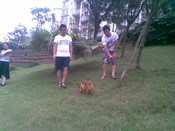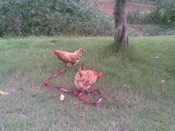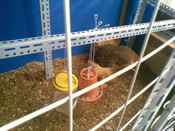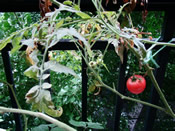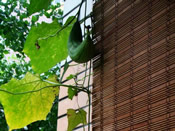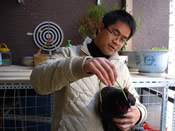By Hu Xiaoping (Programme Officer, PCD Sichuan Office)
 I come from a rural area. When I was small, my family always raised chickens. I had a great time with the chickens we raised at home and it left me with great memories. Now when I visit rural areas for work, every time I see the beautiful chickens raised by the villagers, I am filled with envy.
I come from a rural area. When I was small, my family always raised chickens. I had a great time with the chickens we raised at home and it left me with great memories. Now when I visit rural areas for work, every time I see the beautiful chickens raised by the villagers, I am filled with envy.
Childhood memories of chicken-raising
Last spring, when one of our programmes involved raising pigs in ecological pens my colleague Chongqing and I got talking. Chongqing is more experienced with animal husbandry in rural areas. We probably said something like “why don’t we try to raise chickens on our own balconies?” when we were talking one day. Raising chickens not only provides us with fertiliser and healthy eggs, but also absorbs kitchen waste and gives us some fun in everyday life. I got really excited about the idea.
In March I bought two chicks, only two months old. I remember the day I hid the chicks and successfully avoided the security check on the train. But when I was on the bus, the two chicks escaped and I had to nervously recapture them … It’s amusing to recall. But sadly the two chicks got sick, and died within two weeks. I buried them under a big tree in the green zone of our residential area so that they could return to the soil.
Walking with chickens at weekends
I suspect that the two chicks got sick because there was too little space in the pen for them to move around. I felt guilty and built a much bigger chicken pen. I followed the suggestion of Dexian, another colleague, in the design of the pen to satisfy the chickens’ natural social hierarchy. The nest for laying eggs was put in a dark corner of the pen. When I went to the countryside for work, I collected sawdust from a village and a lumber mill to make a fermented bed. When everything was ready, I could not wait to go to the market to buy two hens that were six months old. One hen had big eyes, so I called her Dayan [ “big eyes” in putonghua]. The other had a piece of flesh hanging from her chest so I called her Honglingjin [ “red neckerchief”].
This time everything went well. They ate and drank and lived happily in the chicken pen with the fermented bed. After a month or so they started to lay eggs! Oh, how I rejoiced. Since I started raising chickens and growing plants on my balcony, I’ve watered the plants and fed the chickens before going to work every day. Before I come home from work I always go to the market to get vegetable for my chickens. When I buy vegetables, I no longer mind their having a few more shriveled leaves. Sometimes I’ll look for a sugarcane rind which I’ll spread around the pen to supplement the sugar in the fermented bed, to ensure that the microorganisms are sufficient to break down the chicken manure and remove its foul smell. Bok choy, the leaves of the long beans and the wheat I grow on the balcony are also mostly fed to the chickens. At the the weekend, I’ll take them for a walk on the lawn.
Last May I tried to hatch some chicks myself. The two hens came from a chicken farm. To increase their egg-laying rate, they have been “improved” in the farm and have lost their natural behaviour of nesting, so could no longer incubate eggs. This is sad! I tried different ways to hatch eggs. Finally three chicks hatched in July. One was born with a handicapped leg. It was rather weak and died in August. The other two were very healthy. One was white and the other was black. I called them Xiaobai [meaning “little white one”] and Xiaohei [“little black one”]. Now I have four chickens, two adults and two small ones.
Since I started raising chickens half a year ago and after they started to lay eggs, we have never bought eggs. Sometimes I can even bring a few eggs to the office to share with my colleagues. The chickens are like my pets. Not only do they add fun to my life, we have become a bit more self-reliant as well in terms of food. Raising chickens is really a beautiful thing.
Balcony farming in the office
I started growing vegetables on the balcony of my flat in the spring. We have two grape vines and a small white Champak tree. A luffa is grown beneath the tree which it can climb up, so I don’t have to build a trellis. We have been looking forward to growing vegetables on the balcony of the office. When we go to the rural areas for work and see villagers cultivating land, we are rather envious. This is particularly the case with colleagues working on ecological agriculture. The year before last, a colleague brought back some soil from the countryside after a work trip. We started to make compost to create soil. Chongqing even put up a notice on the compost bin, on what should be done to make compost in the office. Everyone is reminded what he/she should take note of and how the compost should be kept, such as what sort of kitchen waste can be added, how it should be covered and the level of humidity that should be kept.
I remember one day a colleague, Sally, found an earthworm in the compost bin. She was so delighted that she told everyone to have a look. At that time the office had a small balcony but it was enclosed by glass windows which were fixed and could not be opened. We were not able to start farming on the balcony, but for a few years flowers were grown on the windowsill, and their blossoms made a beautiful scene in the office. Thus we kept creating soil until the office moved to another place after the last Chinese New Year. We have a bigger balcony now and the long-awaited plan was finally realised. We found a few boxes, took out the soil we’d been creating and started balcony farming.
Fun in practice and learning
The plot is small but we have grown quite a few things. Tomatoes, lettuce, long beans, chives, bok choy and luffa. Someone sowed seeds "unknowingly", when eating oranges. To our surprise, the seeds sprouted. The small garden also became the most ideal and cozy spot in the office for meetings or for a rest. The plants need watering everyday. Sometimes they need a trellis or trimming or insect control. The soil of a balcony garden is usually quite shallow. It’s easy to manage in the summer. Besides watering the plants regularly, we also try to add mulch using shredded paper. This helps conserve water and the paper becomes soil when it rots.
In the last season, we got a great harvest from our tomatoes. However, after the tomato plant started to bear fruit and when the fruits were about to turn red, they cracked. Different reasons for this were suggested by colleagues and friends from other organisations. Some said it was due to lack of trace elements, others said it was due to the drastic change in Chengdu’s weather. Some said it was because the fruit had become wet from rain. As all kinds of opinion were voiced, Dexian came back from Hong Kong with a pack of bat droppings to provide the tomato plant with added nutrition.
Calling up memories of Nature
Vegetables that were harvested from the balcony became table delicacies for us. Lettuce and long beans are always served during lunch. Bok choy and vegetable worms are fed to my chickens. In August, on the day before Sally left for Hong Kong, we had a hearty meal. We prepared lunch together. All the tomatoes were picked. Together with eggs laid by my chickens, we made a genuine tomato fried egg.
I’m thankful to the small balcony. It has brought us, urban dwellers, closer to Nature and calls up in our memory the smell of land and plants, that feel familiar and strange at the same time.


